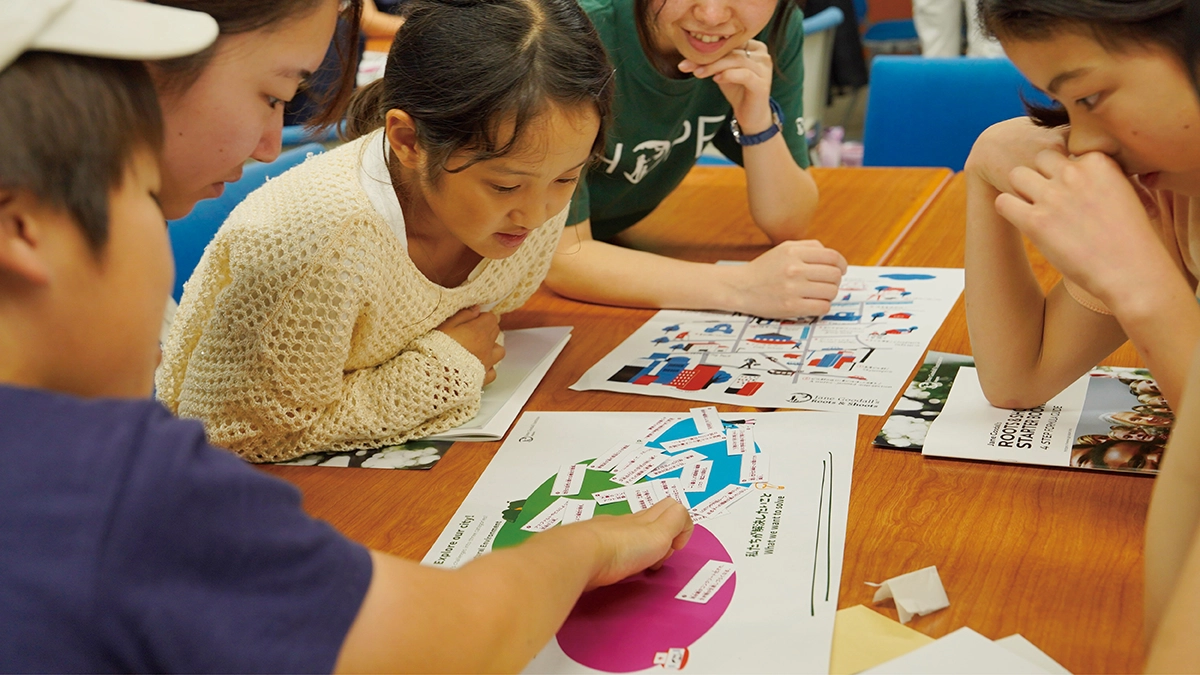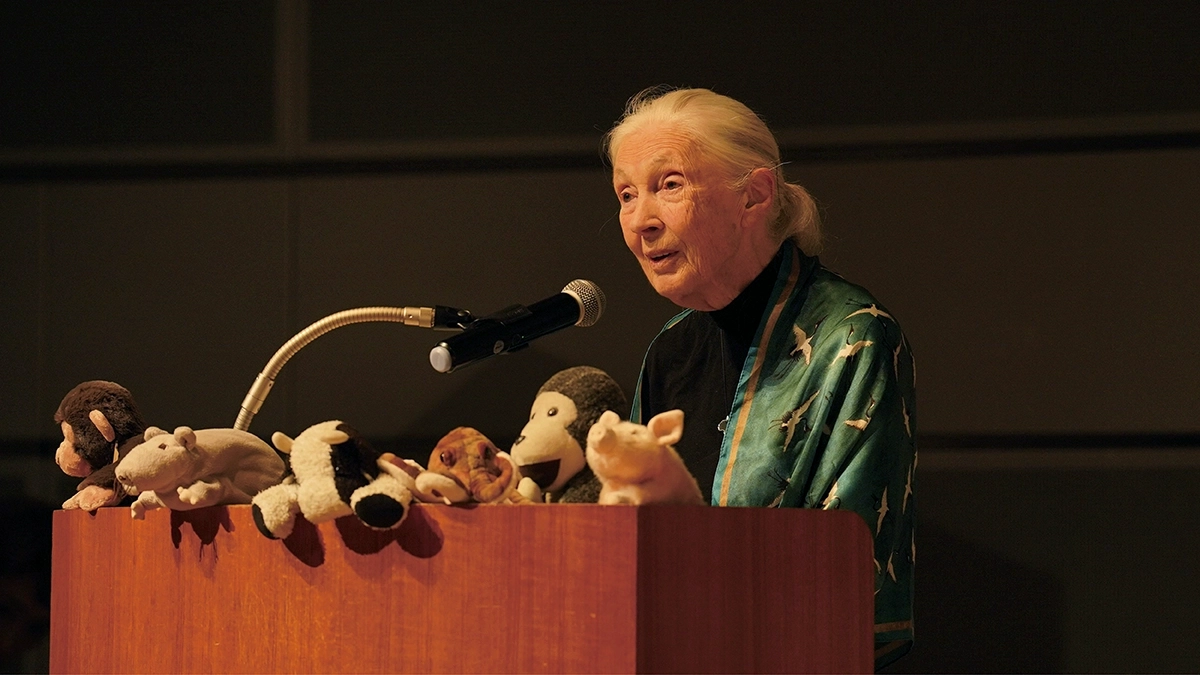Best Moments
2025 6/14 (SAT)
DAY 3
Peace, Hope, and Roots & Shoots 平和を希求して
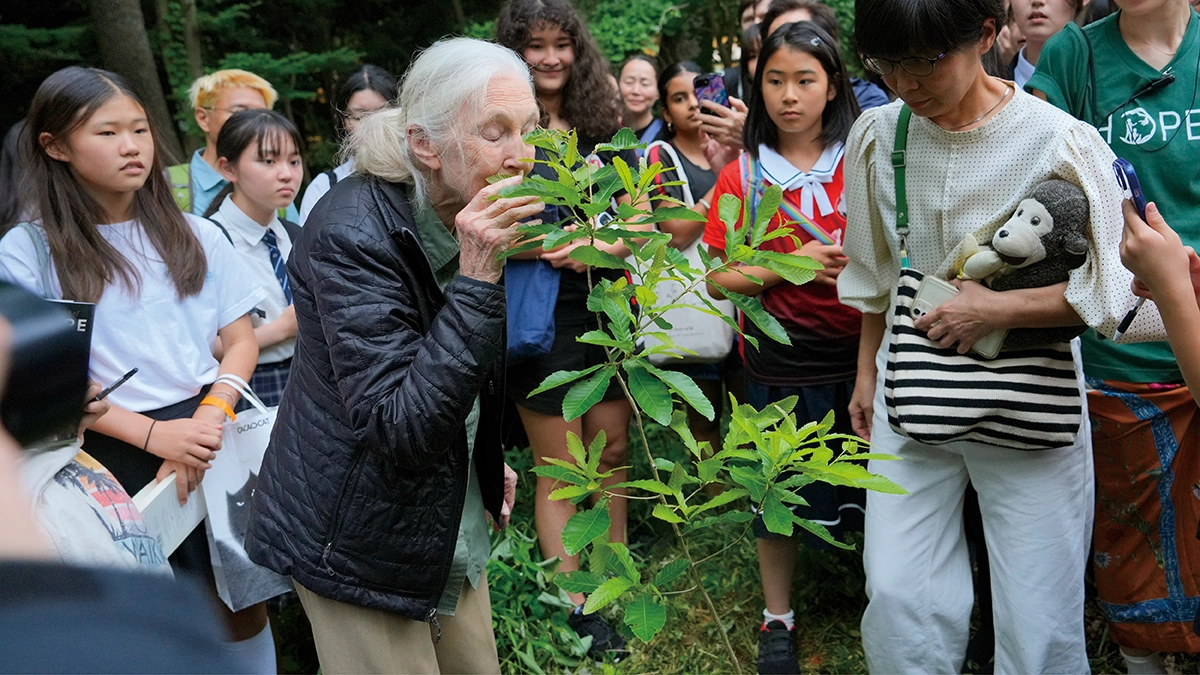
"My True Hope for Peace Lies in Roots & Shoots"
Fireside Chat with Dr. Jane Goodall
On the final day, people of all ages and backgrounds gathered to nurture hope in harmony with nature. Her closing took the form of a relaxed public interview—a fireside chat—with radio host and longtime volunteer interpreter for JGI Japan, Mona Neuhauss.
15:00
Dr. Jane Goodall Public Interview
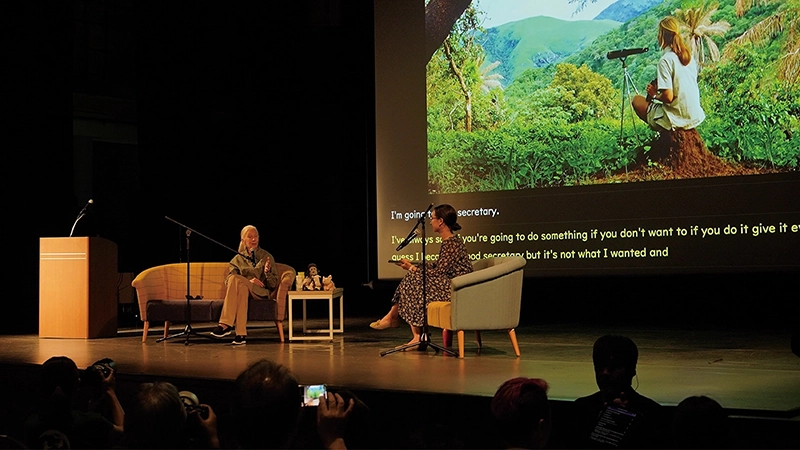
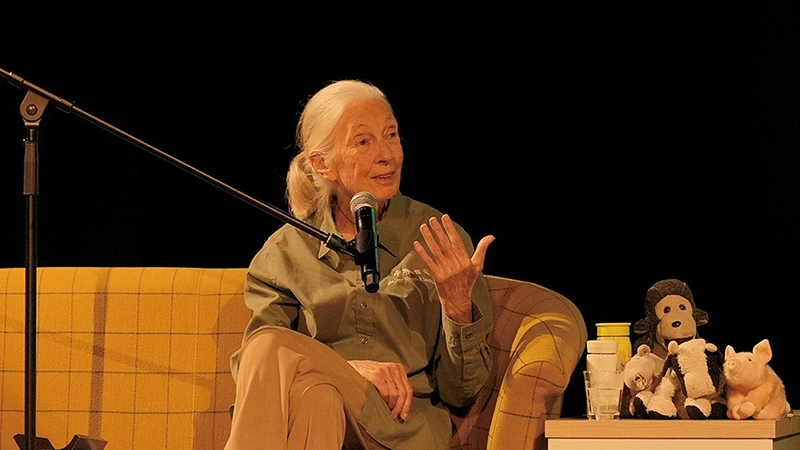
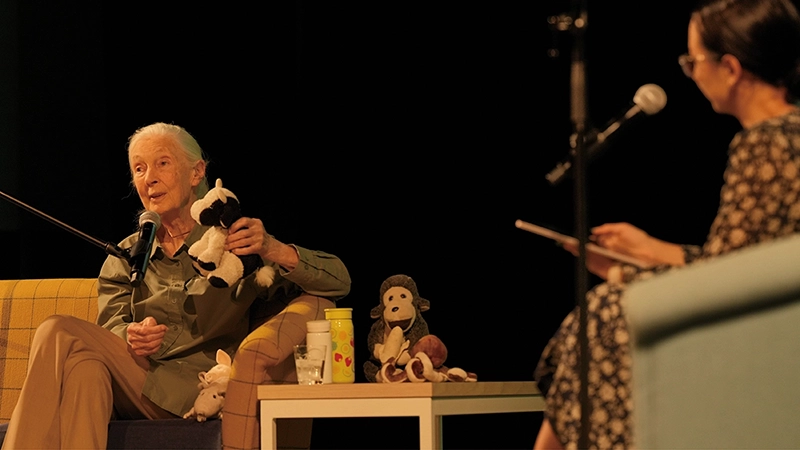
Settled into a comfortable sofa in a warmly lit space, Dr. Goodall began by asking, "Could we brighten the room lights? I’d like to see the faces of the audience too." As the lights rose and she saw the crowd, a smile spread across her face.
Thus began the talk titled "Peace, Hope and Roots & Shoots." Dr. Jane opened with a memory from when she was just a year and a half old: she had brought an earthworm into bed out of fascination. Rather than scolding her, her mother simply said, “You must have been curious about how it moves without legs.” That moment, she explained, became a foundational example of the value of curiosity and compassionate parenting.
She spoke of her dream, formed at age 10, to live with wild animals in Africa and write books about them. That dream came true through persistence and support—and it led to her groundbreaking discovery that chimpanzees use tools, shaking the foundations of science and challenging the notion of what makes humans special.
Yet, she added, "When I learned that chimpanzees also wage war, it devastated me. But it also meant they really are so like us." She emphasized that emotions—love, jealousy, even hatred—are not uniquely human. We are connected by a shared continuum of life.
Reflecting on war, she recounted experiencing WWII as a child: "I was five when it began. I lived through the air raids, and then came the Holocaust, the atomic bombings in Hiroshima and Nagasaki... I saw the darkness humanity is capable of."
Still, she emphasized that despite the horrors of conflict—in Gaza, Ukraine, Sudan, the Congo—we must act. That belief is what led her to launch the Roots & Shoots youth program in 1991, which now spans over 75 countries. "Roots & Shoots engages young people from kindergarten to university. The goal is to take action—for people, for animals, for the environment. Whether it's picking up litter, planting trees, or protecting wildlife, every action matters. Every step becomes a seed of hope."
Toward the end of the talk, Dr. Goodall reflected: "I feel I was put on this Earth with a mission—to help people understand their connection to the natural world, and to believe that individual action has the power to bring change. Hope is harder to deliver these days. But we must keep trying. And I will keep sharing it for the rest of my life."
15:45
Youth Presentations: Roots & Shoots in Action
From across Japan, young members of Roots & Shoots came together to present their local initiatives—proof that hope is not just spoken, but lived. The day featured nine groups:
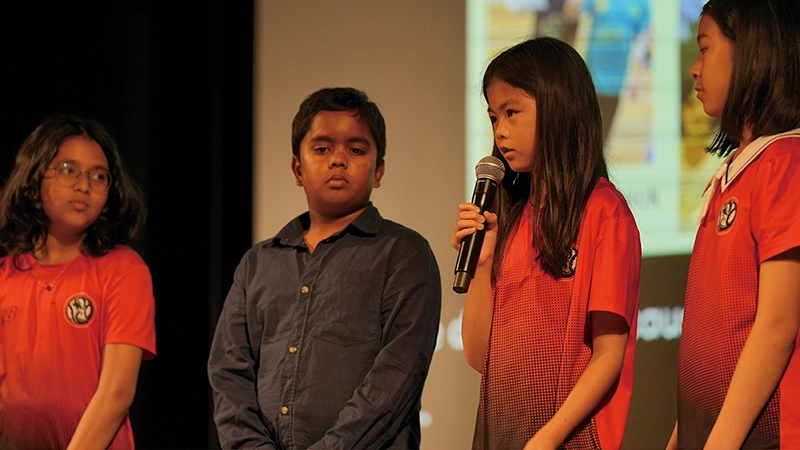
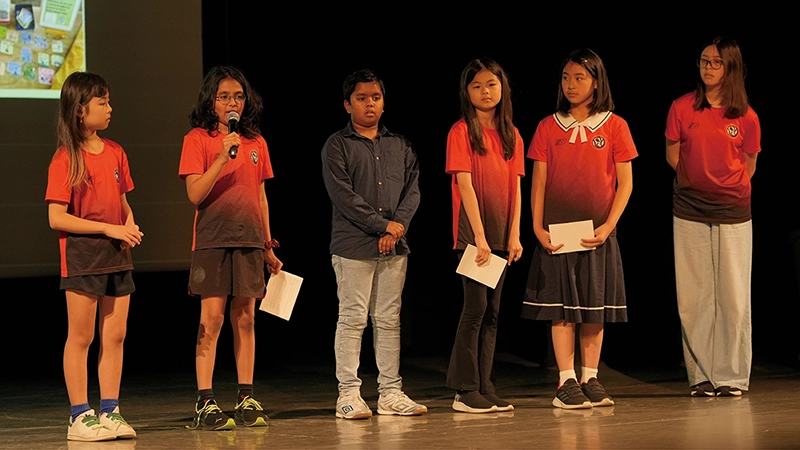
Yokohama International School Elementary School 横浜インターナショナルスクール 初等部
The Roots & Shoots Elementary team at Yokohama International School consists of 36 students who collaborate across grade levels to take action for the environment, animals, and people. One of their key initiatives was proposing the shift from disposable glue sticks to refillable ones, which led to school-wide adoption. Their projects also include cleaning and collecting Tetra Pak cartons for recycling into toilet paper, developing automatic watering devices, crafting with recycled materials, and hosting food fairs to support various causes.
During the Roots & Shoots Youth Conference, the team also presented an original story titled Mr. H, portraying environmental destruction from an animal’s perspective—a creative effort to inspire empathy and highlight the preciousness of all life. Believing that “small actions can lead to big change,” the students are determined to pass on their message to the next generation.
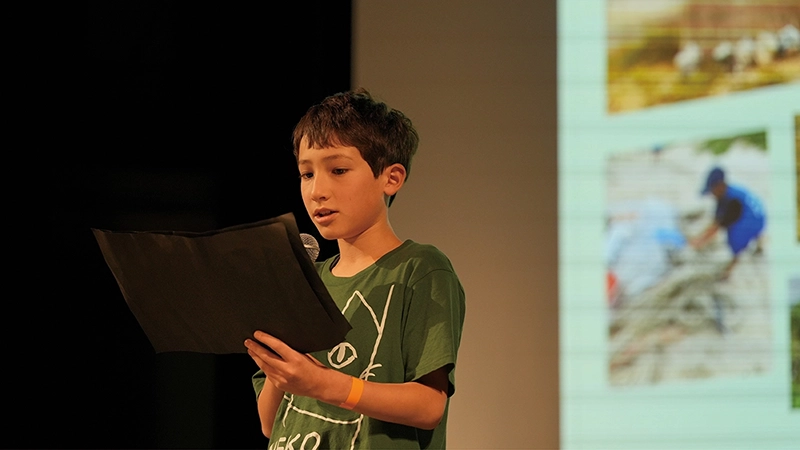
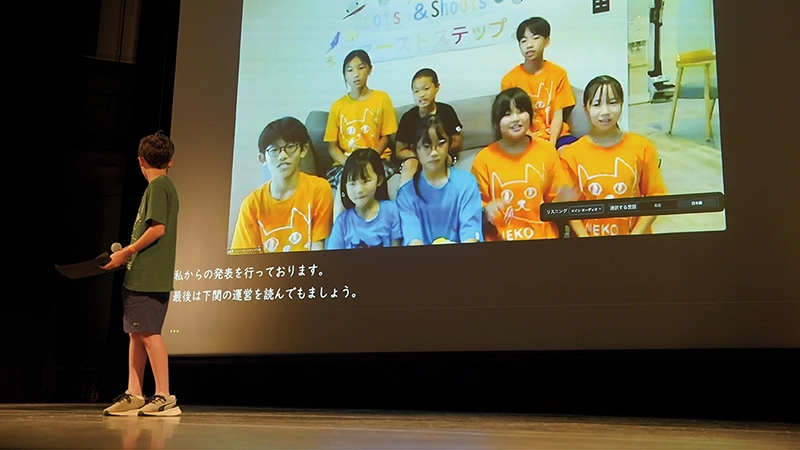
First Step Shimonoseki ファーストステップ下関
“First Step” is a group of 11 elementary and junior high school students from Shimonoseki and Sanyo-Onoda. One member traveled all the way from Yamaguchi to present at the event in Tokyo, while others joined online. Their first activity began with picking up litter—sparked by concerns for animals, including a dog that accidentally swallowed a cigarette butt. They have since conducted five beach cleanups and regular neighborhood litter patrols.
After finding a horseshoe crab carcass during a cleanup, their interest in biodiversity deepened, especially with the realization that one of Japan’s largest tidal flats was nearby. They also launched an animal protection initiative. To work toward zero euthanasia, they invited a local health official to speak, made and sold soy candles to raise funds, and donated supplies to animal shelters. Today, they help promote adoption events and exchange video messages with a group in California. Their motto: “Do what we can, when we can—with joy.”
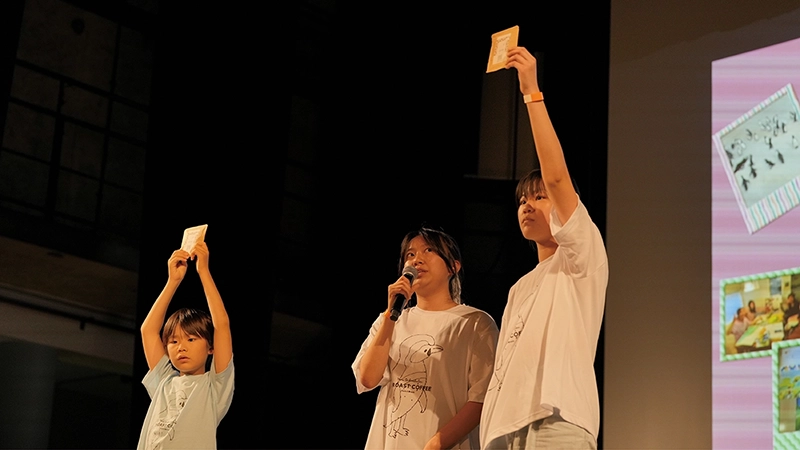
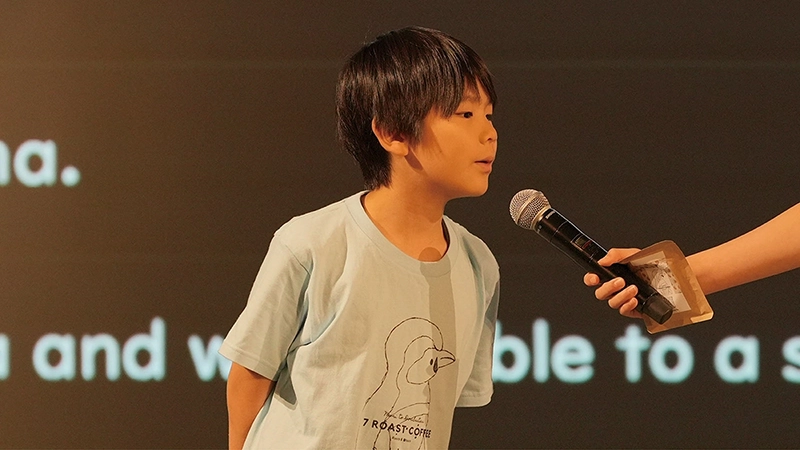
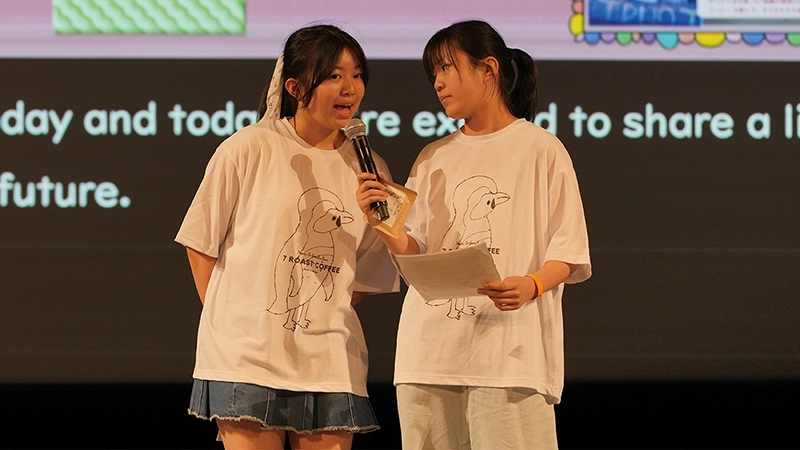
Mori to Doubutsu 森と動物
“Mori to Doubutsu” is a small group of family and friends who act to protect nature, animals, and people’s well-being. Their passion for wildlife was sparked by time spent in New Jersey and inspired by Dr. Jane Goodall’s work. Their efforts include litter pickups, collecting bottle caps, repurposing old clothes, and participating in food drives. They also hosted beeswax wrap-making workshops to promote sustainable living, including a session at the Roots & Shoots conference.
After visiting a rural village in Zambia—where children walk over an hour to school and risk encounters with wild animals—the group organized a mock classroom event and crowdfunding campaign to support school infrastructure. Their first campaign funded windows, chairs, and roofing materials. In their current effort, they are working with Harukiya Coffee to offer coffee as a return gift. True to their name (“Mori” means forest), they’ve planted olive trees at home and supported local tree planting in Zambia and through the Mitsubachi Art Contest. Their warm and powerful message: making the future better for animals, communities, and children—one step at a time.
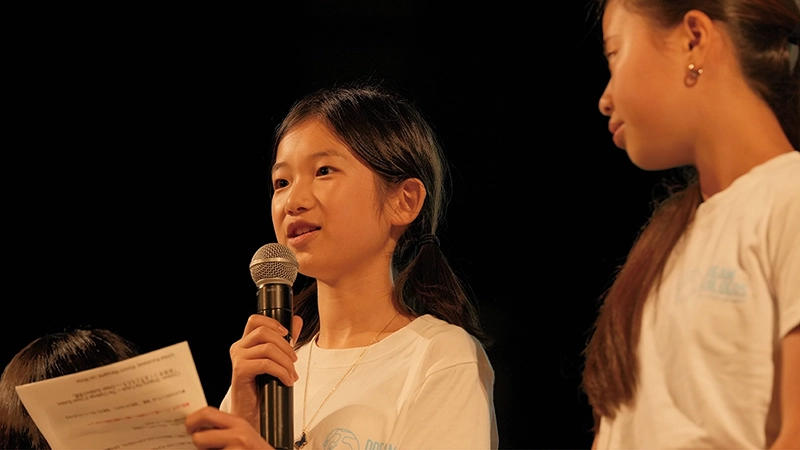
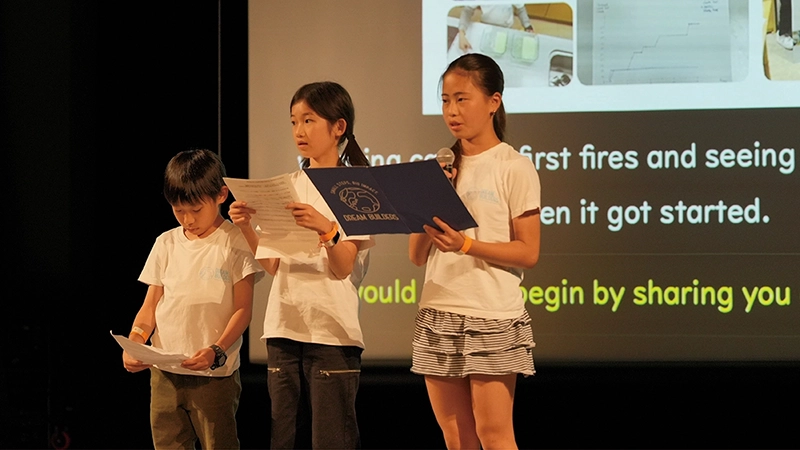
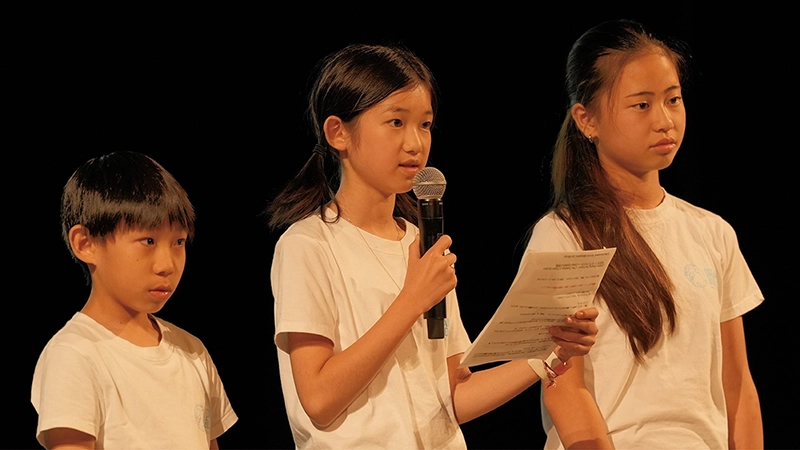
Dream Builders ドリームビルダーズ
Dream Builders is a youth-led team addressing environmental and social issues. Motivated by school learning and documentaries, members became aware of climate change and plastic waste and began taking action, guided by the slogan: “Small steps, big impact.” Believing in the unique power of children’s voices, they started by making and selling “eco-charms” from recycled plastic bottle caps, winning the Grand Prize at the 3rd NEO Awards.
They also organized the Eco Explorers Camp 2025, an environmental education camp where children could learn through hands-on experiences. The initiative was held in collaboration with Dr. Tomonori Sekiguchi from the University of Tokyo’s Center for Global Commons and Earth Day Tokyo.
To strengthen community ties, they raised 500,000 yen through crowdfunding and launched a local partnership program called “DB Smile Partners.”
Since their founding with just three members, Dream Builders has grown to around 30 members and now includes a Nagoya branch. Inspired by Dr. Goodall, they carry the belief that the future isn’t just something to wish for—but something to build, together.
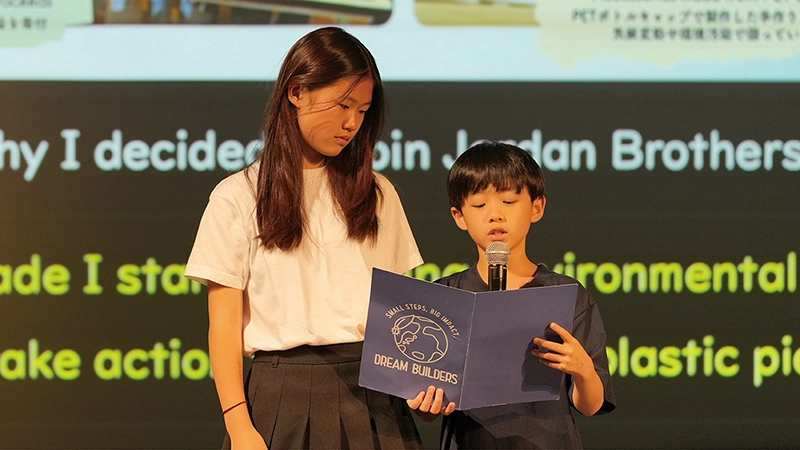
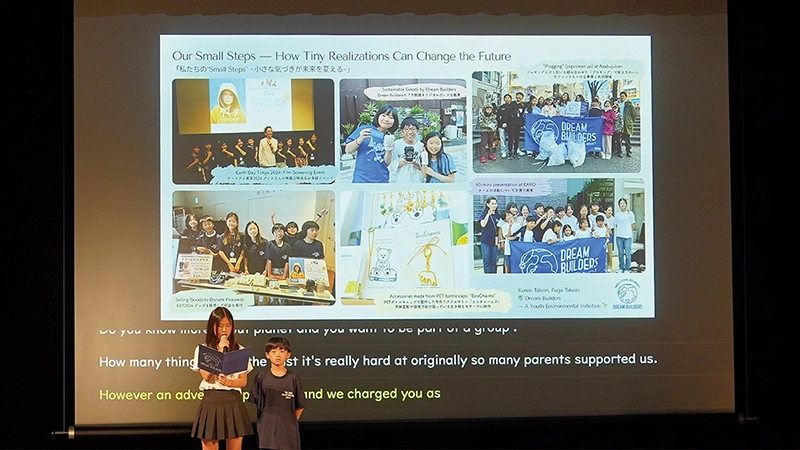
Dream Builders ドリームビルダーズ
Karen (Grade 6) and her younger brother Fuga (Grade 4) are active Dream Builders members. Karen was inspired by group leader Mirei, who founded the team in second grade after discovering plastic fragments inside a fish. With support from parents, the team started by making products and outreach materials. Now in junior high, members handle preparations for their presentations—such as for the Osaka Expo—on their own.
They admire Greta Thunberg for choosing action over convenience and learned about her efforts through film. After trying “plogging” (jogging while picking up trash), they noticed how much waste lies hidden in familiar places—and how some areas remain clean. They actively practice recycling and spreading awareness, such as reusing notebook paper and using up every page. Their message: “No matter your age, what matters most is having a heart that cares.”
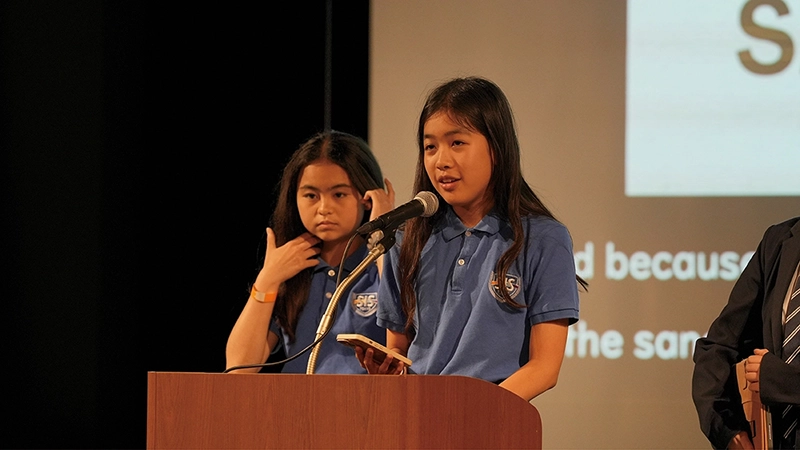
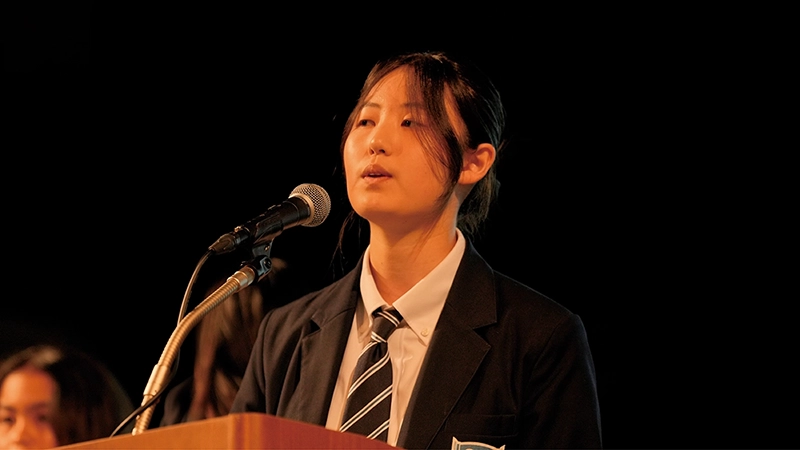
Shinagawa International School 品川インターナショナルスクール
Sixth-grade students from Shinagawa International School visited Yuigahama Beach in December 2024 as part of their Roots & Shoots activities. They explored the coastal ecosystem and learned firsthand about the impact of microplastics on marine life and our food chain. Using sieves to separate microplastics from sand, they deepened their understanding of ocean pollution.
Meanwhile, high school student council members tackled vaccine inequality by launching a campaign to collect bottle caps, which are recycled to fund polio vaccines. Through the Japan Committee, Vaccines for the World’s Children (JCV), over 26,000 caps were collected in a year—equivalent to 2,626 vaccine doses. Their school-wide initiative raised awareness of medical disparities and demonstrated to younger students how small actions can have a global impact.
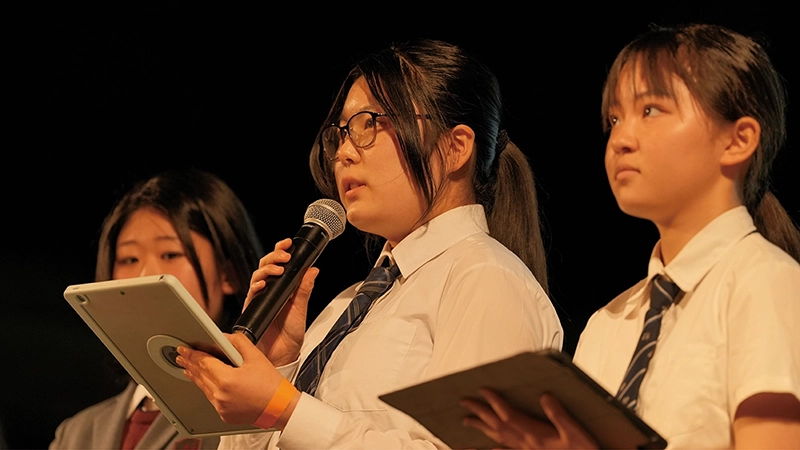
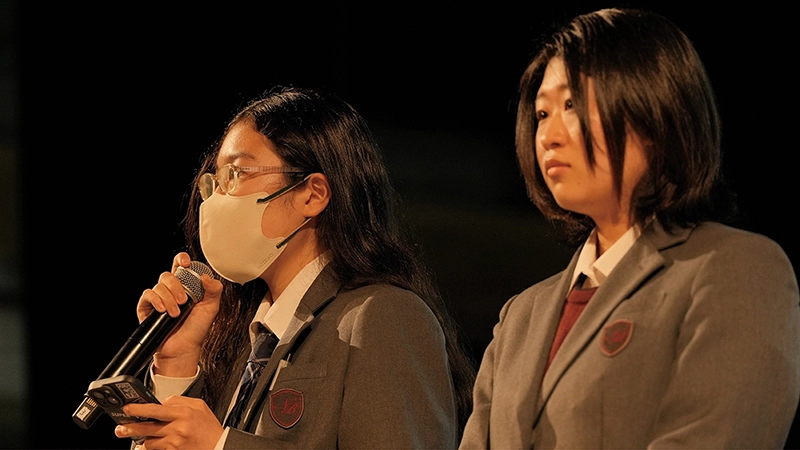
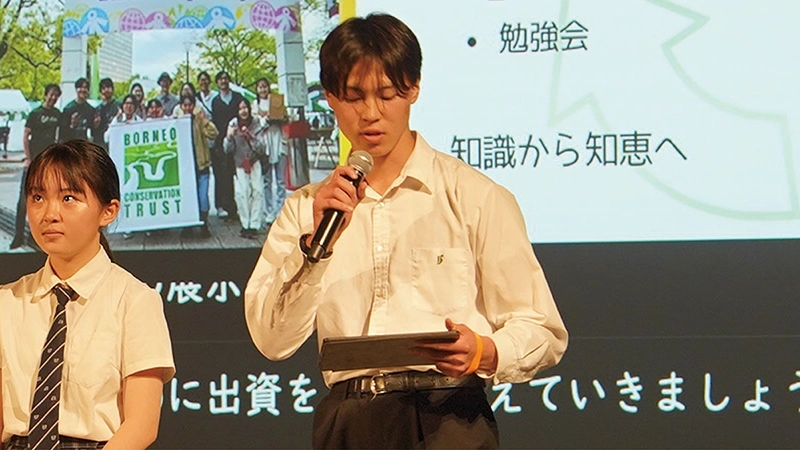
JOHOKU SAITAMA HIGH SCHOOL, Nitobebunkagakuen High School, Tokyo Metropolitan Koishikawa Secondary Education School 城北埼玉高等学校, 新渡戸文化高等学校, 都立小石川中等教育学校
“Journey of Life” is led by three students—Ayako, Hirara, and Sumika—who joined a learning tour to Borneo organized by “School to Connect Life.” There, they observed orangutan and elephant conservation, harvested palm oil, and experienced local biodiversity. Their direct encounter with a wild Borneo elephant left a lasting impression that “environmental issues aren’t distant—they’re personal.”
At Earth Day Tokyo in April, they shared their experiences through exhibits and presentations, highlighting the need for people to “know, think, and act.” Their mission: “Inspire future changemakers through knowledge, thought, and action.” Their vision: “Foster personal awareness by understanding the rainforest ecosystem, examining its challenges, and acting in your own way.”
Group members Enomoto and Nakamura also lead the “Minyak Project,” promoting sustainable palm oil. After watching a video on orangutan rescue in class, they conducted surveys on RSPO-labeled products and sent inquiries to companies with support from Professor Tsukada at Azabu University. One response from Nissin noted that RSPO labeling builds consumer trust and shows environmental commitment. Future plans include installing donation-based vending machines and participating in Earth Day Tokyo.
Another project—led by Kokoro Shima—focuses on raising awareness of “roadkill,” or vehicle-wildlife collisions. Her inspiration: a question—“Why don’t more people know that animals are dying because of us?” Through poster exhibits, interviews with local government and expressway officials, and learning about policy gaps, she realized that social change is possible when public awareness grows. She’s now developing an educational app with quizzes and mini-games to raise awareness in a fun, interactive way.
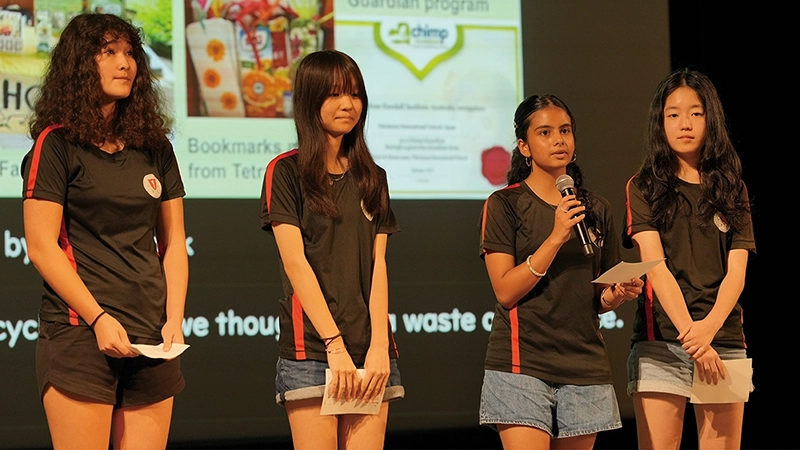
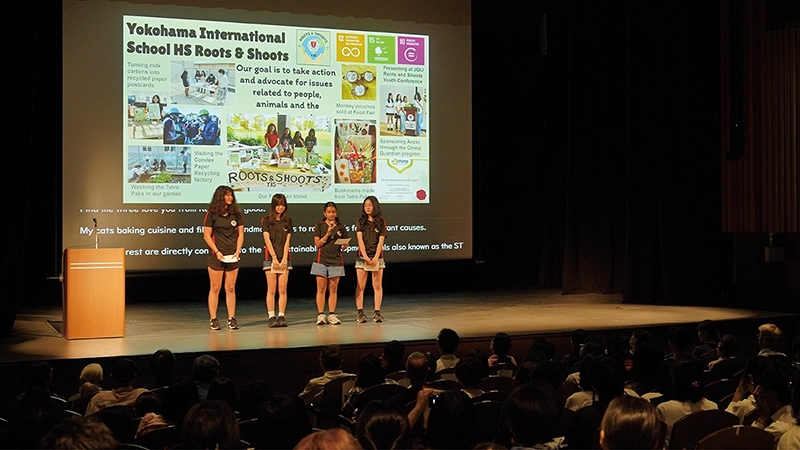
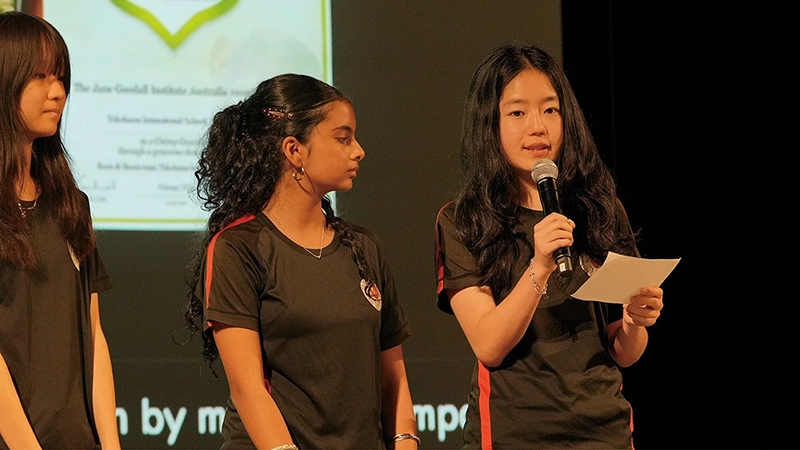
Yokohama International School High School 横浜インターナショナルスクール 高等学校
Led by first-year high school student Rena, this team formed after discovering Roots & Shoots in middle school. Their work centers on caring for the environment, animals, and people. Their “Tetra Pak Send it Back” campaign collects used juice cartons, sending them to factories for recycling into toilet paper. They also turn cartons into handmade postcards and bookmarks, raising funds to support a chimpanzee named Anzac in the Republic of Congo.
Shocked by low local recycling rates, they are collaborating with Yokohama City to help change mindsets. Their belief: “Not all trash is waste—some can become valuable resources.” With this insight, their efforts are planting seeds of change across their school and community.
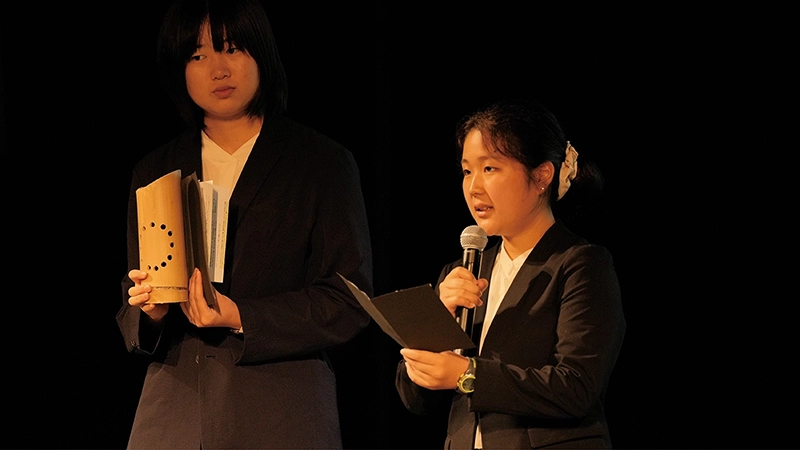
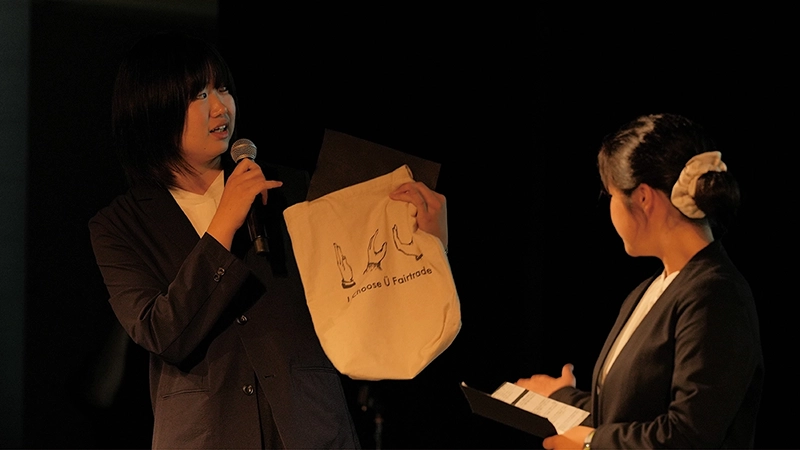
International Christian University 国際基督教大学
The SDGs Promotion Office at International Christian University (ICU) leverages the university's diversity to connect students, faculty, and external stakeholders in building a sustainable future. In 2024, they hosted an ethical market and the “Youth Eco Forum,” where students shared ideas and perspectives.
They also ran a lantern-making workshop using bamboo harvested on campus during the ICU Festival—offering experiential learning about the connection between natural resources and human life. Their ongoing campus forest restoration, nature walks, and fair trade awareness campaigns show how universities can serve as hubs for both knowledge and action. Clothing swaps and collection drives further highlight the practical ways we can all make a difference. ICU’s efforts illuminate how academic institutions can bridge learning and real-world impact.
16:45
Tree Planting and Closing Remarks by Dr. Jane Goodall
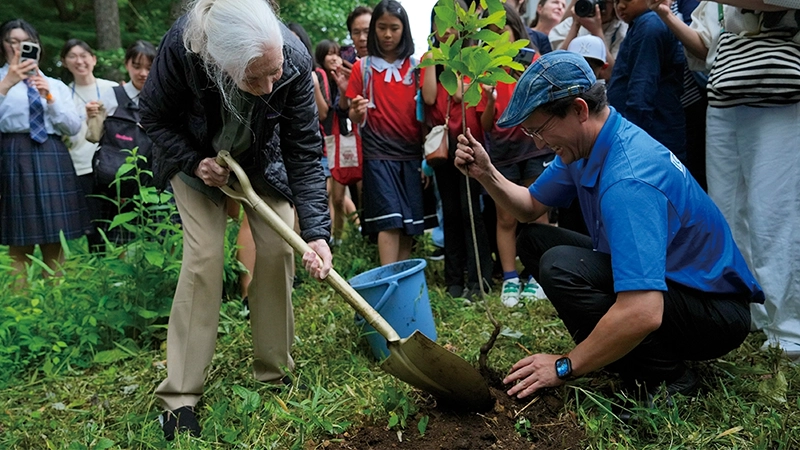
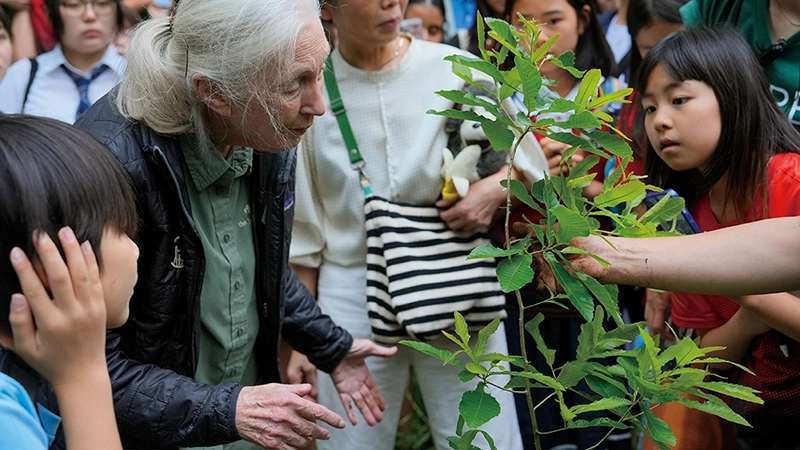
At the close of the event, Dr. Jane Goodall shared heartfelt words with a touch of humor: “Well, I've suddenly been asked to kind of round this up, which I wasn't expecting, but I'm sure all of you have been impressed by our roots and huge group, by the breadth of what they're doing between them. And when you think that this is happening in 75 countries around the world, I wonder if you can imagine how I feel from starting some movement like this, which is only going to grow.
It will grow long after I'm gone. So congratulations to all of those of you who presented today. And I know that some of you are presenting for a much larger group, so please thank the rest of your group when you go back. And I just hope that you've been as inspired as I have by everything that we've seen this evening. Thank you so much.”
At the end of the day, Dr. Jane participated in a symbolic tree planting on the ICU campus, as part of its woodland restoration project. She gently kissed the young konara oak sapling—a quiet yet powerful expression of her enduring hope. Through this act, she reminded all present of our deep connection with nature and the responsibility we share to protect it.
PHOTO: KAORI NISHIDA
Co-hosted by:
International Christian University / Educators For Future (EFF)
Supported by:
British Embassy Tokyo
DAY 3
Peace, Hope, and Roots & Shoots
平和を希求して
6/14 (SAT) 13:00 - 17:30


